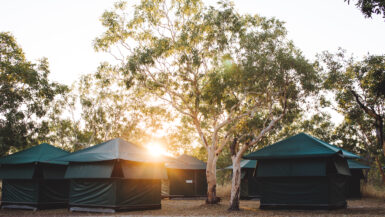Malaysia is a country known for its natural beauty, from lush rainforests to crystal-clear waters. For those who love camping, Malaysia offers a plethora of options, with many eco-friendly camping sites that allow you to enjoy nature while minimizing your impact on the environment. Whether you’re looking for a secluded spot in the mountains or a beachfront campsite, there are plenty of eco-friendly options to choose from. In this article, we’ll take a look at the best eco-friendly camping sites in Malaysia, highlighting their unique features and what makes them a great choice for environmentally-conscious travelers.
Introduction to Eco-Friendly Camping and Its Benefits
Camping is a wonderful way to connect with nature and enjoy the great outdoors. However, traditional camping practices can have a negative impact on the environment. That’s where eco-friendly camping comes in. Eco-friendly camping, also known as sustainable camping, focuses on minimizing the environmental impact of camping while still enjoying all the benefits of being in nature.
Eco-friendly camping is all about being mindful of the environment and making conscious choices to reduce waste, conserve resources, and preserve natural habitats. This can include using eco-friendly camping gear, practicing responsible camping practices, and choosing campsites that prioritize sustainability.
The benefits of eco-friendly camping are numerous. Not only does it help to protect the environment, but it also allows campers to have a more authentic and immersive experience in nature. By being mindful of our impact on the environment, we can create a more sustainable future for ourselves and for generations to come.
In this article, we will explore the best eco-friendly camping sites in Malaysia, as well as the importance of responsible camping practices, eco-friendly camping gear, and how to plan an eco-friendly camping trip. We will also discuss the role of eco-tourism in promoting sustainable travel and ways to minimize the impact of camping on the environment. By supporting eco-friendly camping sites, we can all do our part to protect the environment and enjoy the beauty of nature in a responsible and sustainable way.
Top Eco-Friendly Camping Sites in Malaysia
Malaysia is a beautiful country with a diverse range of landscapes, from lush rainforests to pristine beaches. There are many eco-friendly camping sites throughout the country that offer a sustainable and responsible way to experience this natural beauty. Here are some of the top eco-friendly camping sites in Malaysia:
Taman Negara National Park
Taman Negara National Park is one of the oldest rainforests in the world and is home to a diverse range of flora and fauna. It is a popular destination for eco-tourists and offers several eco-friendly camping sites. The campsites are designed to have minimal impact on the environment and are equipped with composting toilets and rainwater harvesting systems. The park also has strict rules in place to ensure that visitors practice responsible camping practices.
Pulau Perhentian
Pulau Perhentian is a group of islands off the coast of northeastern Malaysia. The islands are known for their crystal-clear waters and stunning coral reefs. There are several eco-friendly camping sites on the islands that offer a sustainable way to experience this natural beauty. The campsites are equipped with composting toilets and use solar power for lighting and water heating.
Bako National Park
Bako National Park is located in Sarawak, on the island of Borneo. The park is known for its unique rock formations, rainforest trails, and diverse wildlife. There are several eco-friendly camping sites in the park that offer a sustainable and responsible way to experience this natural beauty. The campsites are equipped with composting toilets and use solar power for lighting.
Tioman Island
Tioman Island is a small island off the east coast of Peninsular Malaysia. It is known for its pristine beaches, crystal-clear waters, and dense rainforests. There are several eco-friendly camping sites on the island that offer a sustainable and responsible way to experience this natural beauty. The campsites are equipped with composting toilets and use solar power for lighting and water heating.
These are just a few of the top eco-friendly camping sites in Malaysia. By choosing to camp at these sites, visitors can enjoy the natural beauty of Malaysia while also contributing to the conservation and preservation of the environment.
Taman Negara National Park: A Sustainable Camping Destination
Taman Negara National Park is one of the oldest rainforests in the world and is located in the heart of Peninsular Malaysia. The park covers an area of over 4,000 square kilometers and is home to a diverse range of flora and fauna, including tigers, elephants, and the endangered Malayan tiger.
The park offers several eco-friendly camping sites that are designed to have minimal impact on the environment. The campsites are equipped with composting toilets and rainwater harvesting systems, and visitors are encouraged to practice responsible camping practices, such as leaving no trace and minimizing waste.
In addition to camping, there are many other eco-friendly activities to enjoy in Taman Negara National Park, such as hiking, bird watching, and river rafting. The park also offers guided tours that provide visitors with a deeper understanding of the local ecology and conservation efforts.
One of the most popular activities in Taman Negara National Park is the Canopy Walkway, which is the longest suspension bridge in the world. The Canopy Walkway offers visitors a unique perspective of the rainforest canopy and is a must-see attraction for anyone visiting the park.
Overall, Taman Negara National Park is a sustainable camping destination that offers visitors the opportunity to experience the natural beauty of Malaysia in a responsible and eco-friendly way. By choosing to camp at Taman Negara, visitors can contribute to the conservation and preservation of one of the world’s oldest rainforests.
The Importance of Responsible Camping Practices
Responsible camping practices are essential for preserving the natural environment and minimizing the impact of camping on the ecosystem. Here are some of the most important responsible camping practices to keep in mind:
Leave No Trace
The Leave No Trace principle is a set of guidelines that encourage campers to leave their campsite in the same condition as they found it. This means packing out all trash and leaving natural features, such as rocks and plants, undisturbed.
Minimize Your Impact
When camping, it’s important to minimize your impact on the environment as much as possible. This can include using biodegradable soap, avoiding the use of single-use plastics, and using a camp stove instead of building a fire.
Respect Wildlife
When camping, it’s important to respect the wildlife in the area. This can include keeping a safe distance from animals, storing food properly to avoid attracting wildlife, and avoiding feeding animals.
Follow Campsite Rules
Many campsites have specific rules in place to protect the environment and ensure the safety of visitors. It’s important to follow these rules and regulations to minimize your impact on the environment and ensure a safe and enjoyable camping experience for everyone.
By practicing responsible camping practices, we can all do our part to protect the environment and ensure that future generations can enjoy the natural beauty of our planet.
Eco-Friendly Camping Gear and Equipment
Choosing eco-friendly camping gear and equipment is an important part of sustainable camping. Here are some tips for selecting eco-friendly camping gear:
Choose Sustainable Materials
When selecting camping gear, look for products made from sustainable materials, such as bamboo, organic cotton, and recycled materials. Avoid products made from plastic or other non-biodegradable materials.
Use Solar-Powered Gear
Using solar-powered gear, such as solar lanterns and chargers, can help reduce your carbon footprint and minimize waste. Solar-powered gear can also save you money on batteries and electricity.
Invest in Reusable Products
Investing in reusable camping products, such as water bottles, utensils, and food containers, can help reduce waste and minimize your impact on the environment. Look for products made from sustainable materials, such as stainless steel or bamboo.
Choose Biodegradable Soap
When camping, it’s important to use biodegradable soap to avoid contaminating water sources. Look for soap that is specifically designed for camping and is labeled as biodegradable.
By choosing eco-friendly camping gear and equipment, we can minimize our impact on the environment and enjoy a more sustainable camping experience.
How to Plan an Eco-Friendly Camping Trip in Malaysia
Planning an eco-friendly camping trip in Malaysia is a great way to enjoy the natural beauty of the country while minimizing your impact on the environment. Here are some tips for planning an eco-friendly camping trip:
Choose an Eco-Friendly Campsite
When planning your camping trip, choose a campsite that prioritizes sustainability and has eco-friendly practices in place. Look for campsites that have composting toilets, rainwater harvesting systems, and strict rules in place to ensure that visitors practice responsible camping practices.
Use Public Transportation
Using public transportation, such as buses or trains, is a more eco-friendly way to travel than driving. Consider taking public transportation to your campsite to minimize your carbon footprint.
Pack Light and Pack Smart
When packing for your camping trip, pack light and pack smart. Bring only what you need and avoid single-use plastics and other non-biodegradable materials. Choose reusable products, such as water bottles and utensils, and invest in eco-friendly camping gear, such as solar-powered lanterns and chargers.
Practice Responsible Camping Practices
When camping, it’s important to practice responsible camping practices to minimize your impact on the environment. This can include leaving no trace, minimizing waste, and respecting wildlife.
By following these tips, you can plan an eco-friendly camping trip in Malaysia that is both enjoyable and sustainable. Remember, every small change we make can have a positive impact on the environment and help to preserve the natural beauty of our planet.
The Role of Eco-Tourism in Promoting Sustainable Travel
Eco-tourism is a type of tourism that focuses on responsible travel to natural areas that conserve the environment and improve the well-being of local people. Eco-tourism plays a crucial role in promoting sustainable travel and preserving the natural beauty of our planet. Here are some ways in which eco-tourism promotes sustainable travel:
Conservation and Preservation
Eco-tourism promotes conservation and preservation of natural habitats and wildlife. By supporting eco-friendly camping sites and other sustainable tourism practices, visitors can contribute to the preservation of the environment and help to protect endangered species.
Community Involvement
Eco-tourism involves local communities in the tourism industry and provides economic opportunities that help to improve their well-being. By supporting local businesses and communities, eco-tourism can help to promote sustainable development and reduce poverty.
Educational Opportunities
Eco-tourism provides educational opportunities for visitors to learn about the environment and the importance of conservation and sustainability. By learning about the local ecology and conservation efforts, visitors can gain a deeper understanding of the impact of their actions and make more informed choices.
Minimizing Environmental Impact
Eco-tourism promotes responsible travel practices that minimize the impact on the environment. By practicing responsible camping practices, using eco-friendly gear and equipment, and supporting eco-friendly tourism initiatives, visitors can reduce their carbon footprint and contribute to a more sustainable future.
Overall, eco-tourism plays a crucial role in promoting sustainable travel and preserving the natural beauty of our planet. By supporting eco-friendly camping sites and other sustainable tourism initiatives, we can all do our part to protect the environment and create a more sustainable future for ourselves and future generations.
The impact of camping on the environment and ways to minimize it
Camping is a great way to connect with nature and enjoy the outdoors, but it can also have a negative impact on the environment if not done responsibly. Setting up camp, cooking, and using the bathroom can all leave a mark on the environment. However, with some simple steps, we can minimize the impact of camping and ensure that our natural surroundings remain pristine for future generations to enjoy.
One of the biggest impacts of camping is the waste generated from cooking and eating. Disposable plates, cups, and utensils can take years to decompose and can harm wildlife if not disposed of properly. To minimize waste, campers can bring reusable dishes and utensils and pack out all trash. This includes food waste, which should be disposed of in designated areas or packed out.
Another way to minimize the impact of camping is to use biodegradable soaps and detergents when washing dishes or taking a shower. These products break down naturally and are less harmful to the environment. Campers should also avoid using chemicals or pesticides that can harm wildlife or pollute water sources.
When setting up camp, it’s important to choose a designated campsite to minimize the impact on the surrounding area. Campers should avoid setting up camp in sensitive areas like meadows, wetlands, or near water sources. It’s also important to use existing fire rings or stoves and not create new ones. This helps to prevent damage to the soil and vegetation.
Finally, campers should practice Leave No Trace principles, which encourage people to minimize their impact on the environment. This includes packing out all trash, staying on designated trails, and respecting wildlife and their habitats.
By taking these simple steps, campers can minimize their impact on the environment and ensure that our natural surroundings remain pristine for future generations to enjoy.
The benefits of supporting eco-friendly camping sites
Eco-friendly camping sites are becoming increasingly popular as people become more aware of the impact of their actions on the environment. By supporting these campsites, campers can help to preserve the natural environment and promote sustainable tourism. Here are some of the benefits of supporting eco-friendly camping sites:
Preservation of natural resources
Eco-friendly camping sites are designed to minimize the impact on the environment. They often use renewable energy sources like solar power and wind power, and they may have composting toilets and greywater systems to reduce water usage. By supporting these campsites, campers can help to reduce their carbon footprint and preserve natural resources.
Promotion of sustainable tourism
Eco-friendly camping sites promote sustainable tourism by encouraging visitors to respect the environment and local communities. They often have educational programs and activities that teach visitors about the local environment and cultural heritage. By supporting eco-friendly camping sites, campers can help to promote sustainable tourism and support local economies.
Improved camping experience
Eco-friendly camping sites often provide a unique and immersive camping experience. They may be located in remote or pristine areas, and they may offer activities like hiking, wildlife watching, and stargazing. By supporting these campsites, campers can enjoy a more authentic and meaningful camping experience.
Contribution to conservation efforts
Many eco-friendly camping sites are located in protected areas like national parks and wildlife reserves. By supporting these campsites, campers can contribute to conservation efforts and help to preserve these areas for future generations.
In conclusion, supporting eco-friendly camping sites can have many benefits for both campers and the environment. By choosing to camp at these sites, we can help to promote sustainable tourism, preserve natural resources, and contribute to conservation efforts.





Leave a reply